Contract Law: Evaluating Remedies for Andrew & Margaret vs Agent
VerifiedAdded on 2023/06/07
|5
|1331
|202
Case Study
AI Summary
This case study examines a scenario where Andrew and Margaret, seeking a restful holiday, relied on a travel agent's advice and booked a trip to Gunk Island. The island failed to meet their expectations, leading to a breach of contract. The analysis focuses on whether Andrew and Margaret can sue the travel agent and what remedies are available to them under contract law. It discusses the distinction between conditions and warranties in contract terms, highlighting the severity of the breach in relation to the promised facilities and amenities. The study further evaluates the types of damages Andrew and Margaret can claim, including medical expenses and additional airfares, while considering the principle of remoteness of damages in contract law. The conclusion asserts the travel agent's breach of contract and identifies potential remedies for Andrew and Margaret, offering a comprehensive overview of their legal standing.
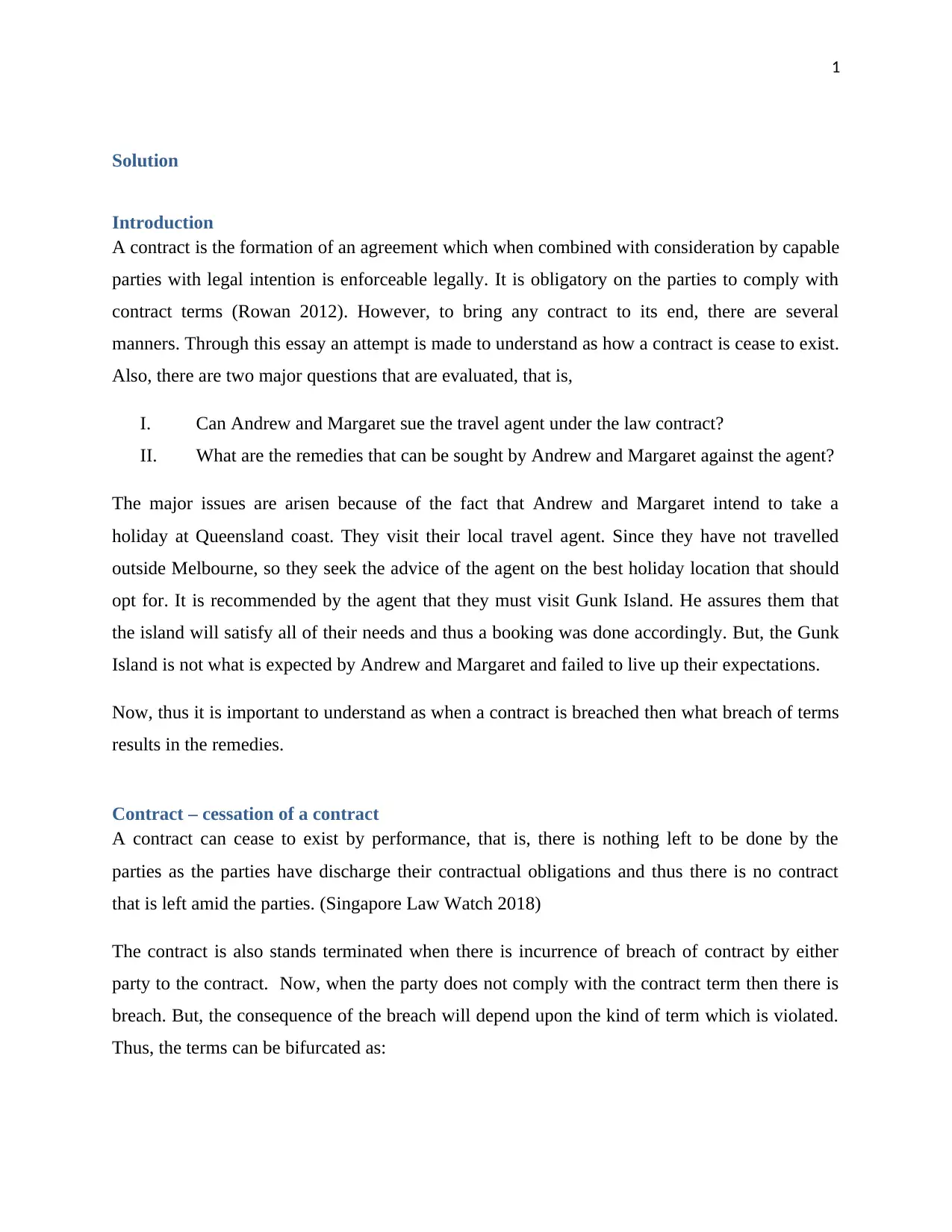
1
Solution
Introduction
A contract is the formation of an agreement which when combined with consideration by capable
parties with legal intention is enforceable legally. It is obligatory on the parties to comply with
contract terms (Rowan 2012). However, to bring any contract to its end, there are several
manners. Through this essay an attempt is made to understand as how a contract is cease to exist.
Also, there are two major questions that are evaluated, that is,
I. Can Andrew and Margaret sue the travel agent under the law contract?
II. What are the remedies that can be sought by Andrew and Margaret against the agent?
The major issues are arisen because of the fact that Andrew and Margaret intend to take a
holiday at Queensland coast. They visit their local travel agent. Since they have not travelled
outside Melbourne, so they seek the advice of the agent on the best holiday location that should
opt for. It is recommended by the agent that they must visit Gunk Island. He assures them that
the island will satisfy all of their needs and thus a booking was done accordingly. But, the Gunk
Island is not what is expected by Andrew and Margaret and failed to live up their expectations.
Now, thus it is important to understand as when a contract is breached then what breach of terms
results in the remedies.
Contract – cessation of a contract
A contract can cease to exist by performance, that is, there is nothing left to be done by the
parties as the parties have discharge their contractual obligations and thus there is no contract
that is left amid the parties. (Singapore Law Watch 2018)
The contract is also stands terminated when there is incurrence of breach of contract by either
party to the contract. Now, when the party does not comply with the contract term then there is
breach. But, the consequence of the breach will depend upon the kind of term which is violated.
Thus, the terms can be bifurcated as:
Solution
Introduction
A contract is the formation of an agreement which when combined with consideration by capable
parties with legal intention is enforceable legally. It is obligatory on the parties to comply with
contract terms (Rowan 2012). However, to bring any contract to its end, there are several
manners. Through this essay an attempt is made to understand as how a contract is cease to exist.
Also, there are two major questions that are evaluated, that is,
I. Can Andrew and Margaret sue the travel agent under the law contract?
II. What are the remedies that can be sought by Andrew and Margaret against the agent?
The major issues are arisen because of the fact that Andrew and Margaret intend to take a
holiday at Queensland coast. They visit their local travel agent. Since they have not travelled
outside Melbourne, so they seek the advice of the agent on the best holiday location that should
opt for. It is recommended by the agent that they must visit Gunk Island. He assures them that
the island will satisfy all of their needs and thus a booking was done accordingly. But, the Gunk
Island is not what is expected by Andrew and Margaret and failed to live up their expectations.
Now, thus it is important to understand as when a contract is breached then what breach of terms
results in the remedies.
Contract – cessation of a contract
A contract can cease to exist by performance, that is, there is nothing left to be done by the
parties as the parties have discharge their contractual obligations and thus there is no contract
that is left amid the parties. (Singapore Law Watch 2018)
The contract is also stands terminated when there is incurrence of breach of contract by either
party to the contract. Now, when the party does not comply with the contract term then there is
breach. But, the consequence of the breach will depend upon the kind of term which is violated.
Thus, the terms can be bifurcated as:
Paraphrase This Document
Need a fresh take? Get an instant paraphrase of this document with our AI Paraphraser
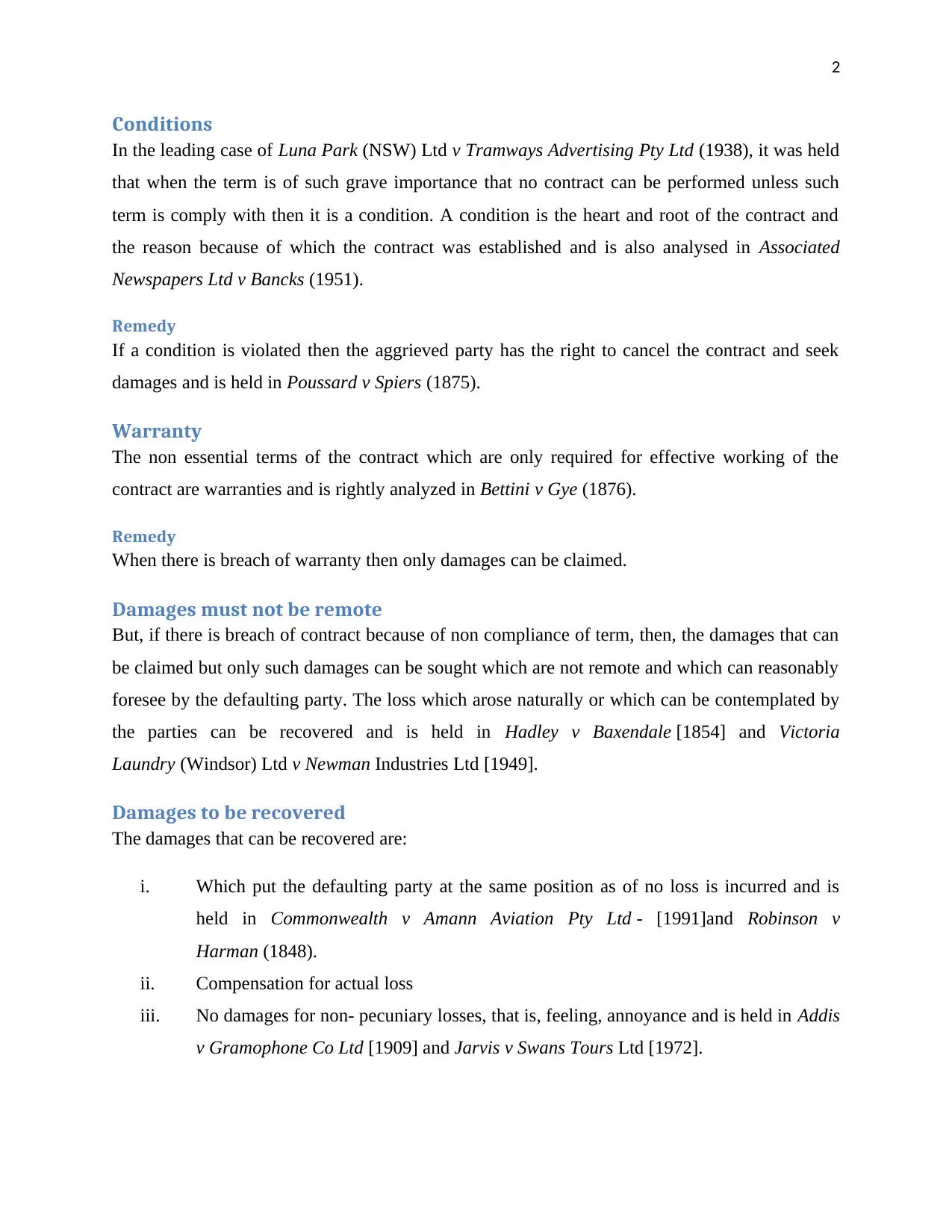
2
Conditions
In the leading case of Luna Park (NSW) Ltd v Tramways Advertising Pty Ltd (1938), it was held
that when the term is of such grave importance that no contract can be performed unless such
term is comply with then it is a condition. A condition is the heart and root of the contract and
the reason because of which the contract was established and is also analysed in Associated
Newspapers Ltd v Bancks (1951).
Remedy
If a condition is violated then the aggrieved party has the right to cancel the contract and seek
damages and is held in Poussard v Spiers (1875).
Warranty
The non essential terms of the contract which are only required for effective working of the
contract are warranties and is rightly analyzed in Bettini v Gye (1876).
Remedy
When there is breach of warranty then only damages can be claimed.
Damages must not be remote
But, if there is breach of contract because of non compliance of term, then, the damages that can
be claimed but only such damages can be sought which are not remote and which can reasonably
foresee by the defaulting party. The loss which arose naturally or which can be contemplated by
the parties can be recovered and is held in Hadley v Baxendale [1854] and Victoria
Laundry (Windsor) Ltd v Newman Industries Ltd [1949].
Damages to be recovered
The damages that can be recovered are:
i. Which put the defaulting party at the same position as of no loss is incurred and is
held in Commonwealth v Amann Aviation Pty Ltd - [1991]and Robinson v
Harman (1848).
ii. Compensation for actual loss
iii. No damages for non- pecuniary losses, that is, feeling, annoyance and is held in Addis
v Gramophone Co Ltd [1909] and Jarvis v Swans Tours Ltd [1972].
Conditions
In the leading case of Luna Park (NSW) Ltd v Tramways Advertising Pty Ltd (1938), it was held
that when the term is of such grave importance that no contract can be performed unless such
term is comply with then it is a condition. A condition is the heart and root of the contract and
the reason because of which the contract was established and is also analysed in Associated
Newspapers Ltd v Bancks (1951).
Remedy
If a condition is violated then the aggrieved party has the right to cancel the contract and seek
damages and is held in Poussard v Spiers (1875).
Warranty
The non essential terms of the contract which are only required for effective working of the
contract are warranties and is rightly analyzed in Bettini v Gye (1876).
Remedy
When there is breach of warranty then only damages can be claimed.
Damages must not be remote
But, if there is breach of contract because of non compliance of term, then, the damages that can
be claimed but only such damages can be sought which are not remote and which can reasonably
foresee by the defaulting party. The loss which arose naturally or which can be contemplated by
the parties can be recovered and is held in Hadley v Baxendale [1854] and Victoria
Laundry (Windsor) Ltd v Newman Industries Ltd [1949].
Damages to be recovered
The damages that can be recovered are:
i. Which put the defaulting party at the same position as of no loss is incurred and is
held in Commonwealth v Amann Aviation Pty Ltd - [1991]and Robinson v
Harman (1848).
ii. Compensation for actual loss
iii. No damages for non- pecuniary losses, that is, feeling, annoyance and is held in Addis
v Gramophone Co Ltd [1909] and Jarvis v Swans Tours Ltd [1972].
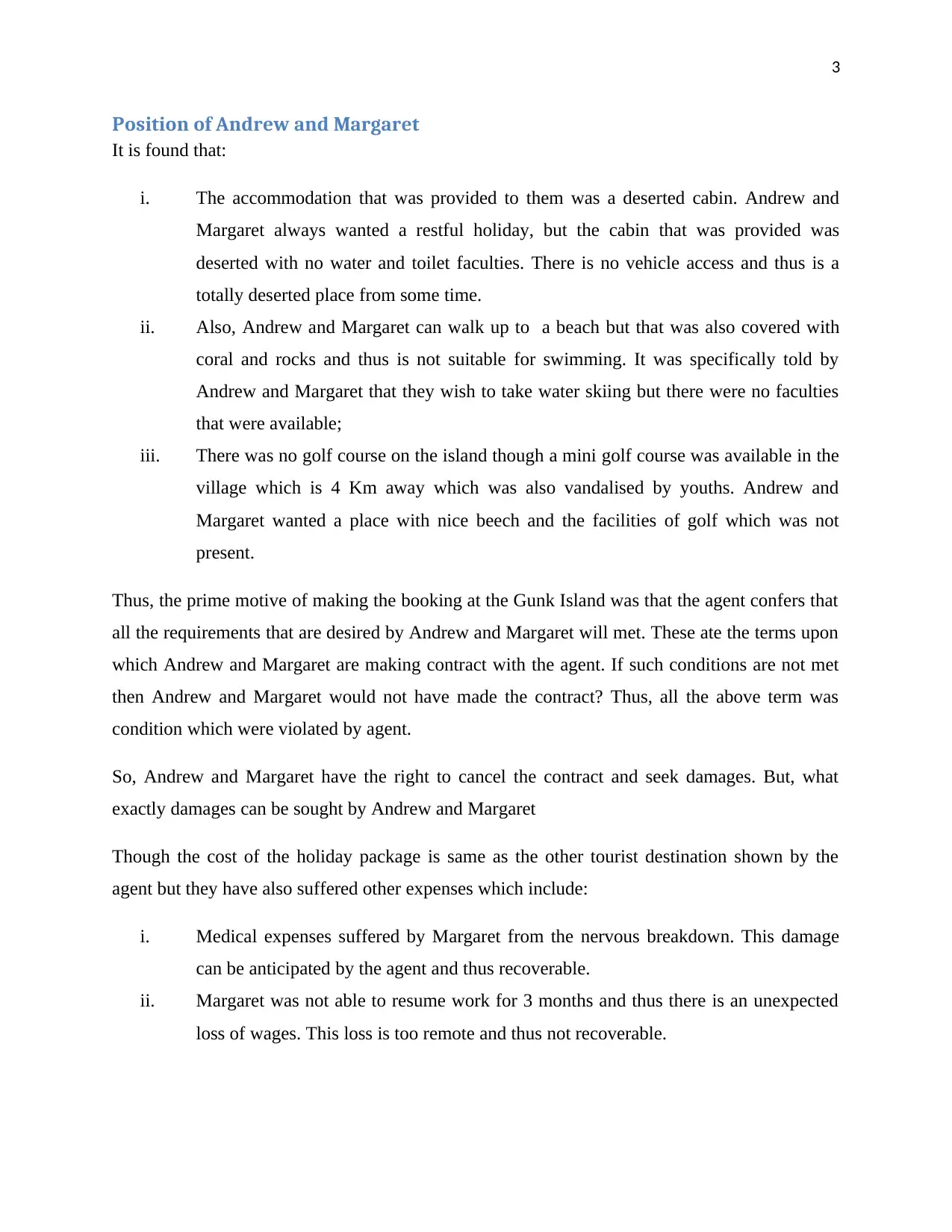
3
Position of Andrew and Margaret
It is found that:
i. The accommodation that was provided to them was a deserted cabin. Andrew and
Margaret always wanted a restful holiday, but the cabin that was provided was
deserted with no water and toilet faculties. There is no vehicle access and thus is a
totally deserted place from some time.
ii. Also, Andrew and Margaret can walk up to a beach but that was also covered with
coral and rocks and thus is not suitable for swimming. It was specifically told by
Andrew and Margaret that they wish to take water skiing but there were no faculties
that were available;
iii. There was no golf course on the island though a mini golf course was available in the
village which is 4 Km away which was also vandalised by youths. Andrew and
Margaret wanted a place with nice beech and the facilities of golf which was not
present.
Thus, the prime motive of making the booking at the Gunk Island was that the agent confers that
all the requirements that are desired by Andrew and Margaret will met. These ate the terms upon
which Andrew and Margaret are making contract with the agent. If such conditions are not met
then Andrew and Margaret would not have made the contract? Thus, all the above term was
condition which were violated by agent.
So, Andrew and Margaret have the right to cancel the contract and seek damages. But, what
exactly damages can be sought by Andrew and Margaret
Though the cost of the holiday package is same as the other tourist destination shown by the
agent but they have also suffered other expenses which include:
i. Medical expenses suffered by Margaret from the nervous breakdown. This damage
can be anticipated by the agent and thus recoverable.
ii. Margaret was not able to resume work for 3 months and thus there is an unexpected
loss of wages. This loss is too remote and thus not recoverable.
Position of Andrew and Margaret
It is found that:
i. The accommodation that was provided to them was a deserted cabin. Andrew and
Margaret always wanted a restful holiday, but the cabin that was provided was
deserted with no water and toilet faculties. There is no vehicle access and thus is a
totally deserted place from some time.
ii. Also, Andrew and Margaret can walk up to a beach but that was also covered with
coral and rocks and thus is not suitable for swimming. It was specifically told by
Andrew and Margaret that they wish to take water skiing but there were no faculties
that were available;
iii. There was no golf course on the island though a mini golf course was available in the
village which is 4 Km away which was also vandalised by youths. Andrew and
Margaret wanted a place with nice beech and the facilities of golf which was not
present.
Thus, the prime motive of making the booking at the Gunk Island was that the agent confers that
all the requirements that are desired by Andrew and Margaret will met. These ate the terms upon
which Andrew and Margaret are making contract with the agent. If such conditions are not met
then Andrew and Margaret would not have made the contract? Thus, all the above term was
condition which were violated by agent.
So, Andrew and Margaret have the right to cancel the contract and seek damages. But, what
exactly damages can be sought by Andrew and Margaret
Though the cost of the holiday package is same as the other tourist destination shown by the
agent but they have also suffered other expenses which include:
i. Medical expenses suffered by Margaret from the nervous breakdown. This damage
can be anticipated by the agent and thus recoverable.
ii. Margaret was not able to resume work for 3 months and thus there is an unexpected
loss of wages. This loss is too remote and thus not recoverable.
⊘ This is a preview!⊘
Do you want full access?
Subscribe today to unlock all pages.

Trusted by 1+ million students worldwide
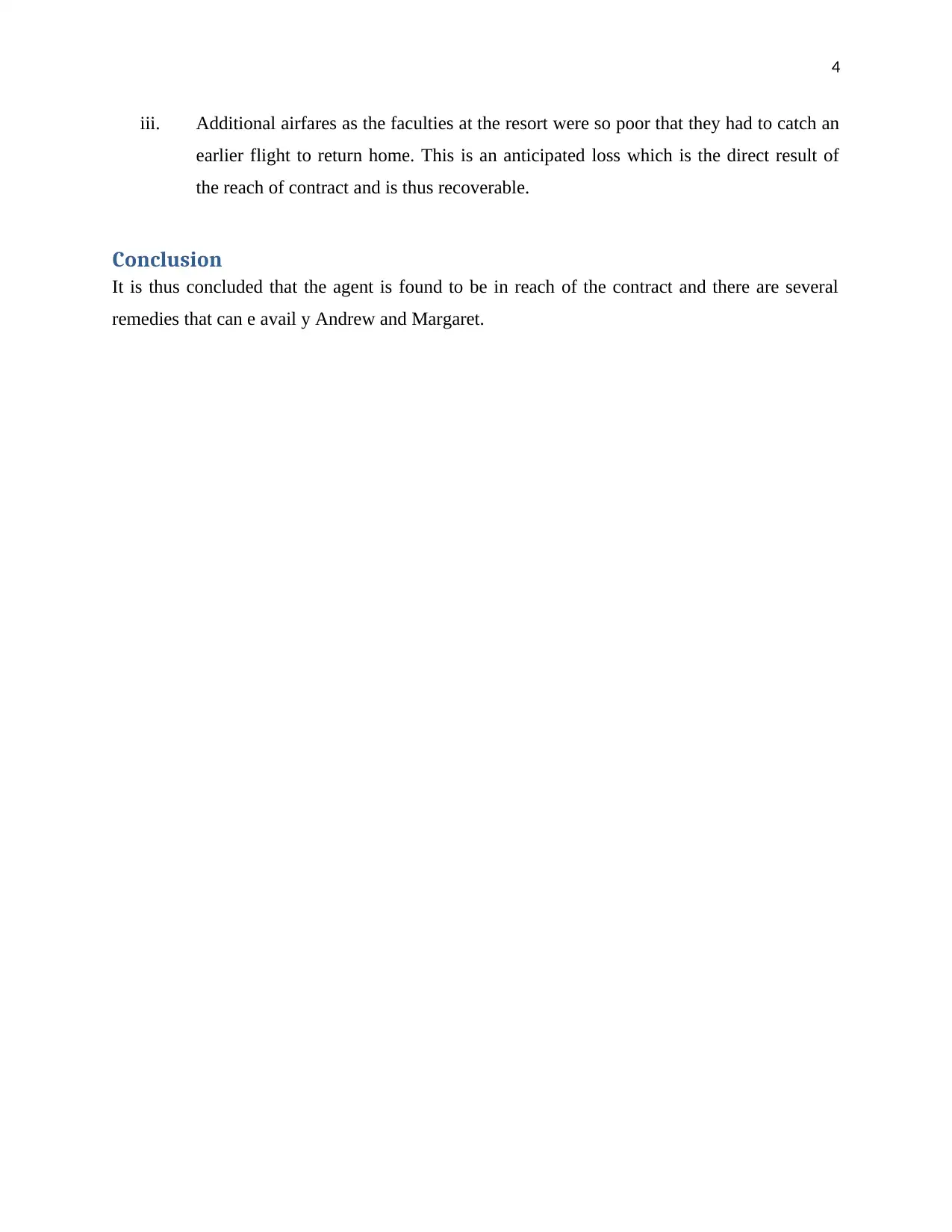
4
iii. Additional airfares as the faculties at the resort were so poor that they had to catch an
earlier flight to return home. This is an anticipated loss which is the direct result of
the reach of contract and is thus recoverable.
Conclusion
It is thus concluded that the agent is found to be in reach of the contract and there are several
remedies that can e avail y Andrew and Margaret.
iii. Additional airfares as the faculties at the resort were so poor that they had to catch an
earlier flight to return home. This is an anticipated loss which is the direct result of
the reach of contract and is thus recoverable.
Conclusion
It is thus concluded that the agent is found to be in reach of the contract and there are several
remedies that can e avail y Andrew and Margaret.
Paraphrase This Document
Need a fresh take? Get an instant paraphrase of this document with our AI Paraphraser
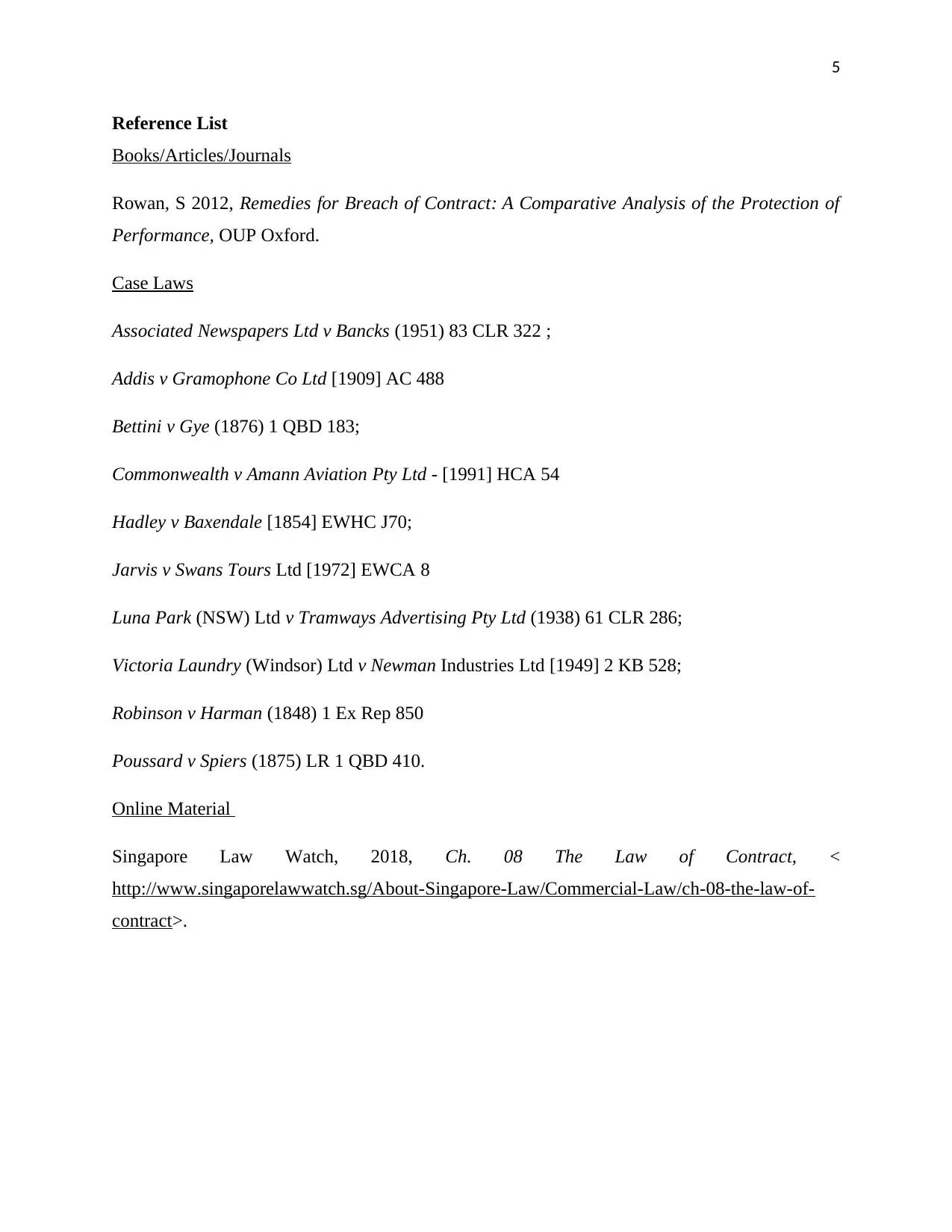
5
Reference List
Books/Articles/Journals
Rowan, S 2012, Remedies for Breach of Contract: A Comparative Analysis of the Protection of
Performance, OUP Oxford.
Case Laws
Associated Newspapers Ltd v Bancks (1951) 83 CLR 322 ;
Addis v Gramophone Co Ltd [1909] AC 488
Bettini v Gye (1876) 1 QBD 183;
Commonwealth v Amann Aviation Pty Ltd - [1991] HCA 54
Hadley v Baxendale [1854] EWHC J70;
Jarvis v Swans Tours Ltd [1972] EWCA 8
Luna Park (NSW) Ltd v Tramways Advertising Pty Ltd (1938) 61 CLR 286;
Victoria Laundry (Windsor) Ltd v Newman Industries Ltd [1949] 2 KB 528;
Robinson v Harman (1848) 1 Ex Rep 850
Poussard v Spiers (1875) LR 1 QBD 410.
Online Material
Singapore Law Watch, 2018, Ch. 08 The Law of Contract, <
http://www.singaporelawwatch.sg/About-Singapore-Law/Commercial-Law/ch-08-the-law-of-
contract>.
Reference List
Books/Articles/Journals
Rowan, S 2012, Remedies for Breach of Contract: A Comparative Analysis of the Protection of
Performance, OUP Oxford.
Case Laws
Associated Newspapers Ltd v Bancks (1951) 83 CLR 322 ;
Addis v Gramophone Co Ltd [1909] AC 488
Bettini v Gye (1876) 1 QBD 183;
Commonwealth v Amann Aviation Pty Ltd - [1991] HCA 54
Hadley v Baxendale [1854] EWHC J70;
Jarvis v Swans Tours Ltd [1972] EWCA 8
Luna Park (NSW) Ltd v Tramways Advertising Pty Ltd (1938) 61 CLR 286;
Victoria Laundry (Windsor) Ltd v Newman Industries Ltd [1949] 2 KB 528;
Robinson v Harman (1848) 1 Ex Rep 850
Poussard v Spiers (1875) LR 1 QBD 410.
Online Material
Singapore Law Watch, 2018, Ch. 08 The Law of Contract, <
http://www.singaporelawwatch.sg/About-Singapore-Law/Commercial-Law/ch-08-the-law-of-
contract>.
1 out of 5
Related Documents
Your All-in-One AI-Powered Toolkit for Academic Success.
+13062052269
info@desklib.com
Available 24*7 on WhatsApp / Email
![[object Object]](/_next/static/media/star-bottom.7253800d.svg)
Unlock your academic potential
Copyright © 2020–2026 A2Z Services. All Rights Reserved. Developed and managed by ZUCOL.





